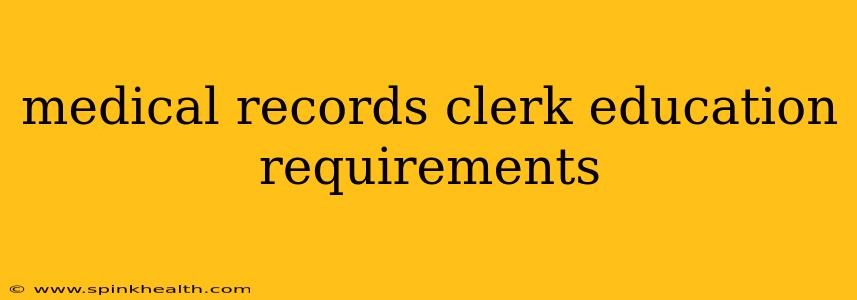Charting a Course: The Education and Skills Needed to Become a Medical Records Clerk
The hushed quiet of a medical office, the organized rows of files, the critical role in ensuring patient information remains confidential and accessible – this is the world of a medical records clerk. It's a career path that blends meticulous attention to detail with a passion for accuracy and organization. But what does it take to become a medical records clerk? Let's unravel the educational requirements and essential skills that pave the way to success in this vital healthcare profession.
My name is Sarah, and for the past ten years, I’ve been working as a medical records clerk. I've seen firsthand the impact a well-organized records system can have on patient care and the overall efficiency of a healthcare facility. In this article, I’ll share my insights and answer some frequently asked questions about becoming a medical records clerk.
What education do you need to be a medical records clerk?
The good news is that the educational barrier to entry for a medical records clerk position is relatively low. While a formal degree isn't always mandatory, a high school diploma or GED is typically the minimum requirement. However, the competition is fierce, and having additional training significantly boosts your chances.
Many aspiring medical records clerks choose to pursue a post-secondary certificate or associate's degree in health information technology (HIT) or medical office administration. These programs provide a solid foundation in medical terminology, record-keeping procedures, electronic health records (EHR) software, and medical coding and billing practices. These skills are highly valued by employers and give you a competitive edge.
Some community colleges and vocational schools offer shorter, more focused certificate programs specifically in medical records management. These programs are designed to prepare you for entry-level positions quickly and efficiently.
What skills are necessary for this job?
Beyond formal education, success as a medical records clerk hinges on a unique blend of hard and soft skills. Let's explore some key areas:
-
Attention to detail: Accuracy is paramount in medical records. A single misplaced document or incorrect entry can have serious consequences. Meticulousness is not just desirable; it's essential.
-
Organizational skills: Medical records often involve a high volume of documents and data. The ability to organize, file, and retrieve information efficiently is crucial. Think of it as being a master librarian for patient health information.
-
Computer proficiency: Most medical records are now managed electronically. Proficiency in EHR software, word processing, and spreadsheet programs is a must. Familiarity with database management systems is also beneficial.
-
Medical terminology: Understanding medical terminology is vital for accurately interpreting and processing medical information. Courses in medical terminology are readily available and highly recommended.
-
Confidentiality and discretion: Medical records contain highly sensitive patient information. Maintaining absolute confidentiality is a non-negotiable requirement. Adherence to HIPAA regulations is critical.
-
Communication skills: You’ll likely interact with physicians, nurses, other healthcare professionals, and patients. Clear and professional communication is essential.
What are the different types of medical records clerks?
While the core responsibilities remain consistent, the specific duties of a medical records clerk can vary depending on the healthcare setting. Some clerks focus primarily on maintaining paper records, while others work exclusively with electronic health records (EHRs). Some roles may involve coding and billing, while others might focus more on data entry and retrieval. Larger hospitals or healthcare systems may even have specialized roles within the medical records department.
What is the job outlook for medical records clerks?
The job outlook for medical records clerks is generally positive, particularly with the continued growth of the healthcare industry and the increasing reliance on electronic health records. The demand for skilled professionals who can manage and protect patient data is likely to remain high.
Is a medical records clerk a good career?
Whether a medical records clerk career is "good" depends on your individual preferences and goals. However, if you enjoy working in a healthcare setting, possess strong organizational skills, value accuracy, and are comfortable working with sensitive information, it can be a rewarding career path. The work is often stable, with opportunities for advancement within healthcare organizations.
My journey as a medical records clerk has been both challenging and rewarding. The work is demanding, but the knowledge that I play a vital role in ensuring the smooth operation of healthcare facilities makes it all worthwhile. If you're organized, detail-oriented, and committed to accuracy, consider exploring this rewarding career path. The future of healthcare relies on meticulous record-keeping, and you could be a crucial part of that future.

